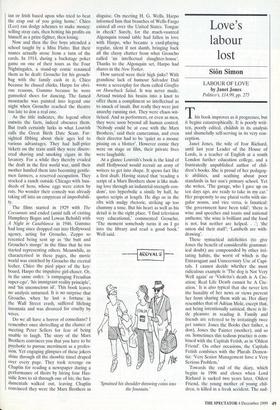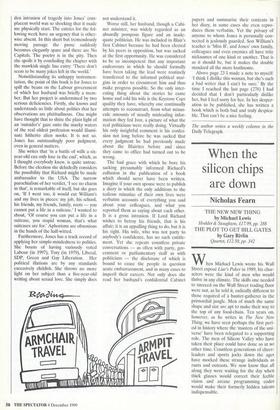Love's labour lost
Sion Simon
LABOUR OF LOVE by Janet Jones
Politico's, £14.99, pp. 275
This book improves as it progresses, but it begins catastrophically. It is poorly writ- ten, poorly edited, childish in its analysis and shamefully self-serving in its very con- ception.
. Janet Jones, the wife of Ivor Richard, until last year Leader of the House of Lords, is a teacher of English at a south London further education college, and a frustratedly unpublished author of chil- dren's books. She is proud of her pedagog- ic abilities, and scathing about poor standards in her son's primary school. Yet she writes, 'The garage, who I gave up on ten days ago, are ready to take in my car.' Her propensity to use plural verbs with sin- gular nouns, and vice versa, is fanatical: 'the government have been told'; 'there is wine and speeches and toasts and national anthems; 'the wine is brilliant and the food is not, but neither are helped. . .'; 'the union did their stuff; 'Lambeth are with- drawing'.
These syntactical infelicities (to give Jones the benefit of considerable grammat- ical doubt) are compounded by other irri- tating habits, the worst of which is the Extravagant and Unnecessary Use of Capi- tals. I cannot decide whether the most ridiculous example is 'The dog is Not Very Well again' or `Violetta's death is A Cre- ation; Real Life Death cannot be A Cre- ation.' It is also typical that she never lets the banality of her news or views prevent her from sharing them with us. Her diary resembles that of Adrian Mole, except that, not being intentionally satirical, there is lit- tle pleasure in reading it. Family and friends are referred to by irritatingly twee pet names: Jones the Books (her father, a don), Jones the Painter (mother), and so on. Sometimes this tedious practice is com- bined with the Capitals Fetish, as in 'Oldest Friend'. On other occasions, the Capitals Fetish combines with the Plurals Demen- tia: 'Very Senior Management have a Very Serious Problem.'
Towards the end of the diary, which begins in 1996 and closes when Lord Richard is sacked two years later, Oldest Friend, the young mother of young chil- dren, is killed in a freak accident. The sud- den intrusion of tragedy into Jones' com- placent world was so shocking that it made me physically start. The entries for the fol- lowing week have an urgency that is other- wise absent. In this short but tremendously moving passage the prose suddenly becomes elegantly spare and there are No Capitals. The poetry is in the pity. Then she spoils it by concluding the chapter with the mawkish single line entry: There don't seem to be many jokes left in the world.'
Notwithstanding its unhappy instrumen- tation, the point of this book is for Jones to spill the beans on the Labour government of which her husband was briefly a mem- ber. But her project is undermined by two serious deficiencies. Firstly, she knows and understands so little about politics that her observations are platitudinous. One might have thought that to shine the plain light of an 'outsider's' gaze onto the murky waters of the real oldest profession would illumi- nate hitherto alien nooks. It is not so. Jones has outstandingly poor judgment, even in general matters.
She writes that 'in a battle of wills a six- year-old can only lose in the end', which, as I thought everybody knew, is quite untrue. Before the election she deludedly considers the possibility that Richard might be made ambassador to the USA. The narrow parochialism of her verdict, 'I see no charm in that', is remarkable of itself, but she goes on, 'If I went too, it would cut William's and my lives in pieces: my job, his school, his friends, my friends, family, roots — you cannot put a life in a suitcase.' I wanted to shout, 'Of course you can put a life in a suitcase, you stupid woman, that's what suitcases are for.' Aphorisms are obnoxious in the hands of the half-witted.
Furthermore, Jones has a track record of applying her simple-mindedness to politics. She boasts of having variously voted Labour (in 1997), Tory (in 1979), Liberal, SDP, Green and Gay Liberation. Her political illations are by any standards excessively childish. She throws no more light on her subject than a five-year-old writing about sexual love. She simply does not understand it.
Worse still, her husband, though a Cabi- net minister, was widely regarded as an absurdly pompous figure and an inade- quate politician. He was included in Blair's first Cabinet because he had been elected by his peers in opposition, but was sacked at the first opportunity. He was considered to be so incompetent that any important endeavours in which he should formally have been taking the lead were routinely transferred to the informal political mar- gins in order to circumvent him and thus make progress possible. So the only inter- esting thing about the stories he came home and told his wife is the Keystone Cops quality they have, whereby one continually attempts to reconstruct, from what minus- cule amounts of usually misleading infor- mation they fed Ivor, a picture of what the real politicians were really doing. Virtually his only insightful comment is his confes- sion not long before he was sacked that every judgment he had previously made about the Blairites before and since they came to office had turned out to be wrong.
The bad grace with which he bore his sacking presumably informed Richard's collusion in the publication of a book which should never have been written. Imagine if your own spouse were to publish a diary in which the only additions to the tedious minutiae of their own lives were verbatim accounts of everything you said about your colleagues, and what you reported them as saying about each other. It is a gross intrusion. If Lord Richard wishes to betray his friends, that is his affair; it is an appalling thing to do, but it is his right. His wife, who was not party to anybody's confidence, has no such entitle- ment. Yet she repeats countless private conversations — as often with party, gov- ernment or parliamentary staff as with politicians — the disclosure of which is bound to cause the people in question acute embarrassment, and in many cases to imperil their careers. Not only does she read her husband's confidential Cabinet papers and summarise their contents in her diary, in some cases she even repro- duces them verbatim. Yet the privacy of anyone to whom Jones is personally con- nected is jealously guarded. Son William's teacher is 'Miss B', and Jones' own family, colleagues and even enemies all have trite nicknames of one kind or another. That is as it should be, but it makes the double standard all the more loathsome.
Above page 23 I made a note to myself: 'I think I dislike this woman, but she's such a bad writer that I can't be sure.' By the time I reached the last page (278) I had decided that I don't particularly dislike her, but I feel sorry for her. In her desper- ation to be published, she has written a book which is both bad and truly despica- ble. That can't be a nice feeling.
The author writes a weekly column in the Daily Telegraph.



















































































 Previous page
Previous page